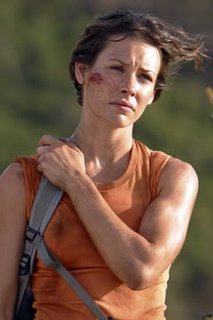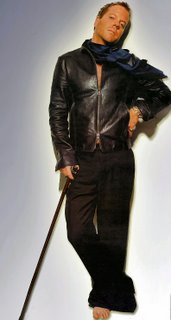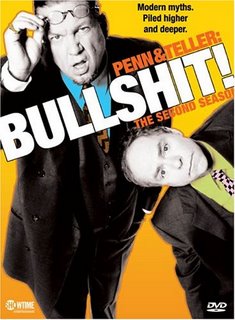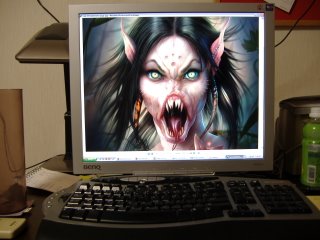Shortly before leaving the United States, television was becoming a minimal part of my life. I was busy with my work, my thesis, and fellowship with comrades. When I had nothing to do, I preferred the entertainment provided by books and video games. Sure I would catch the occasional show on my television (I distinctly remember the riveting and sophisticated
). I'd also watch football or tune into cable news as I prepared dinner. But that's about it.
I figured that when I came to Japan, my TV watching days would be over. I didn't expect to have easy access to television in English or internet approaching speeds of what I had in the states. Turns out I was wrong on both accounts: about 10 english language cable channels came pre-installed in my furnished apartment, and YahooBB's DSL package is almost as good as Comcast Cable Internet back in FC. Watching and downloading TV was easy, and having zero social life made it an enjoyable use of time. But the major factors that boosted my television-viewing were the new Dolby 5.1 computer stereo system I shipped from America and the massive LCD screen I bought in Osaka. Check out this picture of my desk and bask in the awesomeness of my "workstation":
After setting all this up, I borrowed my upstairs neighbor's copy of
Lost Season 1 on DVD and began downloading episodes of
South Park. I then discovered that by replacing my wheeled computer chair with a sofa, I could dim all the lights, place my face less than three inches from the screen, and have my own personal IMAX theater.
The question which many of my five readers might be asking is, "sure, your setting's great, Mr. Crepuscular Ray, but isn't television mind-deadening as far as content is concerned, particularly when evaluated against the collective artistry of film?" Well, my snooty friend, that used to be the case, but then
The Sopranos came along and changed everything.
The main drawbacks with American television drama were that it was (1) commercial driven which disrupted and often neutered the narrative, and (2) strainingly episodic due to the rushed format which demanded entire stories be squeezed into 22- or 43-minute chunks. The effect was that all shows had to progress in the same stale and stultifying formula: tidily build tension to mini-climaxes before each commercial break, then, with three minutes left in the show, have a 90-second big-climax and a brief resolution/reconciliation period to calm the viewer down and entice her or him to watch again next week. Due to these formulaic constraints, deep character development and nuanced plot subtleties were something a viewer could only find in a book or, if lucky, a movie theater. Character detail needed to be blatantly shunted to our brains as directly as possible, and reality-approximation (something viewer minds subconsciously crave) became laughably absurd. In essence, the damning criticism of television drama was well-founded.
When
The Sopranos (and, to some extent, its primitive predecessor
Oz) aired on HBO, all this was shown to be avoidable. The show had no commercial interruption drumbeat to march to, but did have 13 episode hours in which to painstakingly develop the story. While
The Sopranos started out vaguely episodic ("
the one where Tony & Meadow check out colleges" or "
the one with the Hasidic motel operator"), it quickly evolved. Today, any given "episode" in the lives of the extended Soprano family is carefully rendered over the course of several episodes of the show, a technique which far better approximates reality. (Are the episodic events in your life always thematically focused and plotted neatly over a precise segment of time? Probably not.) Furthermore, the brass at HBO gave
The Sopranos writers unprecedented reign over their program's content. The only requirement was that the show had to be good enough to attract and keep subscribers. It didn't need to help sell cars or makeup, and without corporate sponsorship, there was no fear of advertiser boycotts--it could be as offensive as needed in order to be compelling.
Network television producers and writers watched
The Sopranos with envy, and tried their best to ape the show's success in spite of FCC rules and commercial handicaps. Hence the current rise of the serialized drama on primetime network television. Furthermore, with the advent of TiVo, entire TV seasons on DVD, as well as the technological capacity to capture television on computer and share it with strangers, commercial distractions were minimized and an elite class of viewers who could thwart advertisers yet still generate program buzz arose.
All of this leads us to where we are now: instead of sitting in a movie theater to watch a filmed story develop over a two hour chunk, we can now sit at home and watch an even better story develop over 13-24 hours at our leisure (almost like a novel). Fewer crucial story aspects are cut and more story is developed. As a result, better stories are now being told on television and the balance of film-artistry is tipping toward the so-called idiot box.
I never thought I'd see the day.
Anyway, all that is simple background knowlege to set up my next big project: it is my great pleasure to formally announce the existence of something that's already been in informal, unstated existence since I came to Japan:
TV Club.
Here's how it works: I recommend a show to you, my friend, and you in turn recommend a show to me and other readers of this here blog. We then watch the shows and have something to talk about. Easy as pie.
There are only two rules: (1) you must watch
and recommend shows--no leeches who solely feed off others' suggestions, and no arrogant jerks who bandy about their viewing preferences while dismissing everyone else's; (2) suggested shows must be contemporary, i.e. produced within the last five or so years, in order to reflect the new direction the medium has taken. That means no
Greateast American Hero (Zach!), no
MacGyver (Ryan!), no
Simpsons (Matt!), no
Star Trek (Errol!),
Star Trek: Next Generation (Errol!!),
Star Trek: Deep Space Nine (Errol!!!),
Star Trek: Voyager (Errol, you goddamned motherfucker, and don't you dare suggest
Star Trek:Enterprise!), and
no grainy BBC period dramas (that's for you, Elizabeth, assuming you still visit this website!).
Okey-dokey then! Now that all that's settled, for the rest of this post, I'm going to go over shows I've watched since coming to Japan. You can think of them as recommendations, although some are far more recommended than others. Remember, these are all my choices and, as such, they only reflect viewing habits of those with superior taste. (heh heh.) These are all shows I watched since my arrival here, and I present them in the order that I watched them.
LOST Seasons 1 & 2 (ABC) Suggested by: No one. I just got tired of wondering about those silly promos on
Monday Night Football.
It's a show about a bunch of people who survive a plane crash only to find themselves on a mysterious island in the South Pacific. Although it still suffers a bit from commercial-dictated cadence, over-the-top melodrama, and episodic focus (different individual flashbacks pace each episode), season one offered some quality serialized drama with decent character depth and a unique premise.
Season two, however, was realistic only in that it made me wonder if the harsh conditions of the island had somehow given me, the viewer, dysentary. Actually, extreme bloody diarrhea would've been preferable. It was that nauseating. During season two I began calling the show
Island of Irrational Behavior. Everything was starting to get formulaic: character X does inexplicable act, other "important" stuff happens which leaves me annoyed because my mind still demands some explanation for the now paved-over act, and then, two or three episodes later, a feeble rationale is provided for the original inexplicable act that I now barely remember and no longer care much about. I call this story-telling technique
viewer-b-gone. (best reason to watch LOST?)
(best reason to watch LOST?)
Season 1 (HBO) Suggested by: my creepy and weird fascination with Mormons.
On May 7th, 2006, the FBI placed
Warren Jeffs--the apocalypse-prophesyin', gun-collectin', compound-constructin', child-molestin' dictator of America's largest polygamist community--alongside Osama bin Laden on its
10 Most Wanted List. And brass at HBO creamed their pants in sheer delight. Jeffs' skyrocketing notoriety ignited a mini-debate over the ethics of Mormon-related polygamy (although, it should be noted that mainstream Mormons abhor contemporary polygamy and the LDS excommunicates all who practice) at almost the exact same time HBO was unveiling their new drama,
Big Love.
I should first clarify a few important distinctions between Jeffs' cult, the
FLDS, and the Henrickson family portrayed on the show. The
FLDS stockpiles weapons, routinely molests very young girls, banishes young boys (who "compete" with older men looking for more wives), and exists in a self-sustained and isolated vacuum. The Henricksons (a family of one husband and three wives) are unarmed non-molesters fully-integrated in their Salt Lake City community. Except for that whole pesky "no polygamy" rule, they respect the law and act as an otherwise all-American family.
The show itself is fairly decent--well-paced, well-acted, well-written--but somewhat pointless. The primary source of conflict is between the Henrickson patriarch and the polygamist community which banished him as a young boy, yet still manages to disrupt his life. Perhaps the main reason I enjoy
Big Love is its contentious but subversive politics. The show's two creators are a gay couple, and the show's polygamy constantly challenges the traditional "marriage = one man + one woman" definition along similar lines as same-sex marriage enthusiasts. I've always been fascinated by strange pairings , and pairings don't get much stranger than gay liberal activists combined with anti-gay conservative polygamist Mormons. It's almost as delightful as ultra-liberal academic pacifists teaming up with ultra-conservative violent Muslim fascists. Almost. (FYI: there is
a show that somewhat explores that, but I've only just started watching...)
 (the one on the left is my favorite.)
(the one on the left is my favorite.) Seasons 1 & 2 (Sci-Fi)
Suggested by:
George R. R. Martin
I was fairly skeptical going in ... I figured a program produced by the Sci-Fi channel would be low-budget and nerdy. Turns out I was wrong: it's high-budget and nerdy--just the way I like it! The
original 1980s series had a great premise, but sucked because it never went anywhere. This show has the same premise, but actually progresses toward the promised end. It's neither too episodic nor too commercial driven, but rather is a decent serial story that features some quality acting and interesting philosophical rumination of the kind that can only be explored in a sci-fi setting. Plus the special effects are top-notch. Finally, you have to give props to a show that gets around those frakking FCC profanity regulations by using phony frakking profanity!
 (Left: steely-eyed commander of the fleet, who is cool; Right: dopey President of Humanity. She's supposedly a good character but is so annoying I love to hate her. Does that make me evil?)
(Left: steely-eyed commander of the fleet, who is cool; Right: dopey President of Humanity. She's supposedly a good character but is so annoying I love to hate her. Does that make me evil?)
24 Seasons 1-5 (FOX) Suggested by:
Bill Simmons and the R.A.'s in Corbett Hall.
It was fall of 2001 when the FOX action-adventure government spook drama came out. I remember the promos which featured guns and explosions and non-stop life-or-death tension (honestly: who wouldn't enjoy that?) while at the same time showcasing an irritating digital timer, mutiple moving pictures within the same television frame, and a supposedly new style of storytelling hyped as "real time." That all struck me as gimmicky, so I didn't catch the series premiere. But it wasn't until my moronic History of Film professor solemnly recommended the show to the class ("it contains many of the ... um ... things we are talking about in class," she said) that I knew I had made a wise decision not to watch.
Fast forward five years. I'm dropping off a van-full of Japanese students I picked up at DIA to their new home in Corbett Hall at CSU. The three R.A.s that are supposed to be helping us get the new students settled in their room are instead in the lounge, watching
24 on a big screen TV with sound blaring. I peeked my head into the lounge, caught a whiff of tension in the air, and then marvelled as the show abruptly moved into commercial break with the R.A.'s screaming, "oh my God! Oh my God! Did you see that? Oh my God!" It was like football or something. I turned around and noticed a Japanese student, groggy from 20 hours of travel, also peeking in the room. She then looked at me and, beaming, said in rough but enthusiastic English, "Jack Bauer!" It was then that I knew I should give
24 a shot.
And so, a couple months later, I did. And I don't regret it.
24 isn't nearly the best show on TV, but it always offers the same fare and is almost always reliably delicious. It's like a Big Mac. Plus, the innovative writers have invented their own dramatic cliches. What do I mean by that? Well, take this concept: hero must reconcile with his hated boss so that the boss will consent to his own execution at the hands of the hero in order to appease insane terrorist mastermind thereby buying a few more hours of time for the hero to save the day. Although outlandish, intriguing and utterly original right? Wrong. You can expect that kind of crazy originality approximately once every five or six episodes--but only on
24. And that's just one kind of original concept that
24 regularly makes cliche. We also have "nobility in the face of impending demise due to deadly chemical ingestion" or "executive branch loophole replaces commander-in-chief" or, perhaps most classic, "kidnapped loved ones force hero to subvert his own agency, thereby destroying his good name and earning him incarceration and torture at the hands of his betrayed and bewildered comrades."
Finally, you know the show must be good if it somehow makes Keifer Sutherland look manly and menacing. He's just shy of five feet, I think, and sported a spooky mullet for
Lost Boys and a leather skirt/boot outfit in
The Three Musketeers. But in the world of
24, Sutherland survives multiple plane crashes, revelations of unfaithful loved ones, extreme torture (once he was actually tortured to death only to be brought back to life in the next episode via external defibrilator), and heroin addiction and tattooing (those last two were contrived to lend credence to an undercover persona he was developing). Plus, he kills more bad guys in a single day than the state of Texas does all year. He's one of only three original characters from season one who are still alive (
24 writers are brutal to their cast), and although you know they couldn't possibly kill him off, sometimes you kinda wonder...
 (don't worry--he's only an effeminate hobbit in real life.)
(don't worry--he's only an effeminate hobbit in real life.)
Bullshit! Various episodes from seasons 1-4 (Showtime) Suggested by: Errol Jones
This is a fun little non-drama show starring two stand-up comics/magicians (Penn & Teller) who are probably even more libertarian than I. Each episode they examine something they think is Bullshit, and then somewhat thoroughly explain why. I say 'somewhat' because the episodes are hit-and-miss--although more hit than miss, and when they hit they hit hard.
Notable Hits: environmental hysteria, apocalypse prophesies, chiropractors and reflexologists, feng shui, bottled water, endangered species act, 9/11 conspiracy theorists, Gandhi, Mother Teresa, and the Dalai Lama. Notable Misses: creationism (how they missed such an easy target is beyond me) and the Boy Scouts (who cares?). They have other misses too, but it's getting late and I'm having a hard time recalling them. But if you like thought-provoking, profanity-laced, libertarian commentary, you'd probably enjoy this show. (And South Park.)
 (the perfect Mother's Day gift)
(the perfect Mother's Day gift)
Prison Break Season 1 (FOX) Suggested by: no one. I just saw it on the racks at Tsutaya.
Not too good, not too bad. Good premise: guy gets himself thrown in prison so he can bust out his brother who is wrongly sentenced to death row. Execution of plot is so-so. Acting's kind of silly. It's engrossing enough to compel you to watch the entire season (if you're bored) and the main character is an interesting, superintelligent chap--kind of like me, only with full-body tattoos. If you want to make Prison Break at home, just take HBO's Oz, remove its silly "issues" focus, cut back on the sodomy, add lots of fantastic 24ish high-level conspiracy elements, stir together with promised season-ending goal. Viola! Hit TV serial.
 A rare beach view that doesn't show throngs of sunburnt Australians (they were reclining behind me as I shot this). Most of the beaches here are full of topless women, but if I posted a picture with that sort of scenery all my regular readers would have to upgrade (via Visa or MasterCard) to the "Crepuscular Ray Gold Membership Package."
A rare beach view that doesn't show throngs of sunburnt Australians (they were reclining behind me as I shot this). Most of the beaches here are full of topless women, but if I posted a picture with that sort of scenery all my regular readers would have to upgrade (via Visa or MasterCard) to the "Crepuscular Ray Gold Membership Package." 




